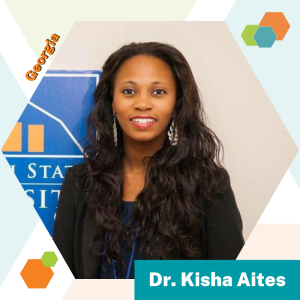Meet technology in education advocate Dr. Kisha Aites, associate dean and professor of Engineering Technology Education, College of Education at Savannah State University and a Fellow in the third cohort of the Postsecondary State CTE Leaders Fellowship at Advance CTE – Sponsored by ECMC Foundation.
[Serving as the president of the Technology Education Collegiate Association (TECA)] expanded my understanding of how CTE fits into the broader picture of workforce development and economic growth. It helped me see CTE not just as a set of courses, but as a powerful system for equal access and opportunity.
 Q: Let’s start with your journey into CTE. How did your background shape your path into this field?
Q: Let’s start with your journey into CTE. How did your background shape your path into this field?
A: My journey into Career Technical Education (CTE) really started at North Carolina A&T State University, where I was a Technology Education major. Being at a Historically Black Colleges and Universities (HBCU) that is so deeply rooted in preparing leaders for industry and education gave me a strong sense of purpose. While at NC A&T, I served as president of the Technology Education Collegiate Association (TECA), which gave me the chance to lead peers, compete nationally, and really see the impact that technology education could have. From there, I continued my studies at Penn State, where I earned my doctorate in workforce education.
That experience expanded my understanding of how CTE fits into the broader picture of workforce development and economic growth. It helped me see CTE not just as a set of courses, but as a powerful system for equal access and opportunity. Both NC A&T and Penn State shaped me to see this work as a calling, connecting education, industry, and community in ways that open doors for students who might not otherwise have those opportunities. That foundation continues to guide my leadership at Savannah State University, where I now focus on building pathways that prepare teachers and students to thrive in today’s workforce.
[Technology rich classrooms are] not just about the equipment, [they’re] about training people to use it in meaningful and ethical ways, especially future teachers who will be leading the next generation.
Q: Technology in education is a critical issue as we move further into the 21st century and usage permeates every aspect of skill development and industry employment needs. How do you address this challenge at your institution and in Georgia?
A: Technology isn’t optional anymore; it’s part of every career, every industry. At Savannah State University, we’ve been intentional about making sure our students and future teachers are prepared. That means creating spaces like a robotics education lab, a Science, Technology, Engineering, and Math (STEM) Education Teaching & Learning Lab, a Science, Technology, Engineering, Art, and Math (STEAM) Innovation Lab, a virtual reality and artificial intelligence teaching lab, and technology-rich classrooms where students can learn by doing.
But it’s not just about the equipment, it’s about training people to use it in meaningful and ethical ways, especially future teachers who will be leading the next generation. In Georgia, we’re also working closely with schools and industry partners to make sure technology is tied to workforce needs, so students graduate with the skills that meet employer needs. It’s about preparing learners not just for the jobs of today, but also for the jobs that don’t yet exist.
Q: You’ve been vocal about the need to evaluate the effectiveness of high schools’ STEM programs to prepare underrepresented and low-income learners for a successful transition to community colleges and universities. Why do you think this is such a crucial issue?
A: For too many students, especially those from underrepresented or low-income backgrounds, the promise of STEM doesn’t match the reality. Students may participate in a program in high school, but when they get to college, they realize there are gaps that make it hard to keep up. That’s discouraging, and it leads to too many leaving the STEM pipeline. Evaluating these programs helps us make sure they’re truly preparing students for the next step, not just introducing them to STEM but equipping them with the knowledge and confidence to succeed in college and beyond. This type of accountability ensures that students aren’t just given opportunities in name, but in practice.
Q: You’ve spoken before about the need to propose and implement strategies that improve recruitment, retention, and support for underrepresented and low-income learners into STEM pathways. Can you share how this commitment has shaped your leadership and actions in your current role?
A: Equal access has to be more than a catchy concept; it has to be baked into everything we do. That’s been my approach in leadership. At Savannah State University, I’ve worked to build programs, scholarships, and targeted supports that help students not just get into STEM but stay and thrive. For example, our iTiger Male Teaching Initiative is about creating a community of support and belonging, which makes all the difference for retention. Mentoring programs, scholarships, and hands-on opportunities are all part of a larger system of support that makes persistence possible. For me, leadership in this space means constantly asking, “Who’s being left out, and what can we do to bring them in and keep them here?”
Q: What do you see as the future of CTE in Georgia and what challenges do you think need to be addressed?
A: I think the future of CTE in Georgia is very exciting, but it’s also going to require some hard work. We have to make sure that pathways from high school to technical colleges and universities are smooth and intentional, not confusing or disconnected. We also need to close the gaps that exist for rural communities and underrepresented students. Another big challenge is keeping up with how fast industries are changing. If we’re preparing students for careers that won’t exist in 10 years, we’re missing the mark. The future will require constant alignment between education and workforce needs, with flexibility and innovation at the center.
Q: You’re clearly passionate about creating long-term change. What advice would you give to others who want to make a difference in CTE and postsecondary participation and attainment?
A: First, listen, listen to students, to families, to employers. They’ll tell you what’s needed if you pay attention. Second, don’t be afraid to step outside of silos. The best solutions usually happen when education, workforce, and community come together. And finally, remember that this work takes persistence. Change doesn’t happen overnight, and sometimes it feels like you’re planting seeds that won’t grow for years. But if you stay committed, you will see the impact.
Q: As a participant in Advance CTE’s national Fellowship, what do you hope to gain from this experience?
A: I see the Fellowship as both an opportunity to learn and to share. I’m excited to learn from colleagues across the country who are doing innovative work in CTE. At the same time, I want to bring my own experiences, particularly around equal access and building strong STEM teacher preparation pipelines, to the conversation. Most importantly, I hope to take what I learn back to Savannah State University and Georgia to strengthen the work we’re doing here. My goal is to leave the Fellowship with strategies, partnerships, and perspectives that can be directly applied to improve outcomes for students in my community, while also contributing ideas that others across the country can adapt for their own contexts.
Dr. Aites journey to CTE leadership underscores a dedication to and enthusiasm for introducing underrepresented learners to technology. Her insights are just one example of the incredible work being done by the fellows of the Advance CTE National Fellowship. To learn more about Kisha and other inspiring leadership fellows, visit the Postsecondary State CTE Leaders Fellowship page, where Fellows share strategies for increasing access to high-quality CTE programming and connecting education outcomes to industry demands.
Interested in developing your own CTE leadership fellowship in your state? Request more information via our request form or contact Dr. Kevin R. Johnson Sr. at [email protected].

